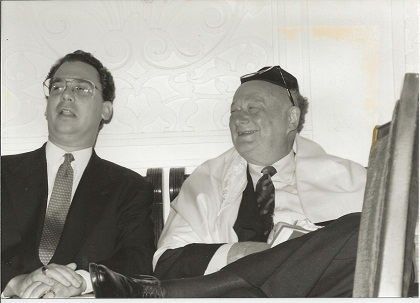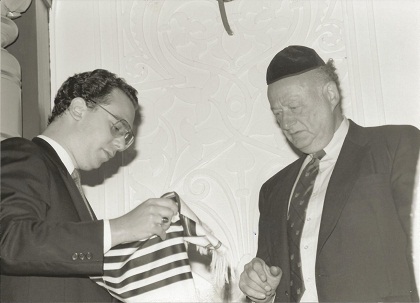
Huffington Post
By Rabbi Marc Schneier
New York City and the entire nation are mourning the passing of former Mayor Ed Koch, a larger-than-life figure who came to personify the city he ran with verve and ebullience for three full terms from 1978-1989. Coming to office at a time when New York was all but bankrupt and seemingly coming apart at the seams, Koch used his mayoralty as a bully pulpit to revive New Yorkers’ belief in the viability of the city as a safe and vibrant place to live and raise their children. Throughout his 12 years in office, Koch worked relentlessly to straighten out the city’s finances, rebuild its housing stock, make Central Park secure and inviting again, and cleanse the city’s subway cars of graffiti.
An unabashedly proud Jew, Koch was fearless in calling out other politicians, including then-President Jimmy Carter, a fellow Democrat, for pursuing policies that Koch believed put Israel’s security at risk. Yet even as he became a Jewish icon, Koch never forgot that he was mayor of all New Yorkers, striving to expand access to affordable housing and jobs for African-Americans and other minorities.
Despite that sterling record, in the days since Koch’s passing some of the media coverage of his legacy has focused on his sometimes vexed relationship with the city’s African-American community. For example, in a mainly positive analysis of Koch’s myriad accomplishments in the New York Times, Joseph Berger wrote that the mayor “needlessly antagonized African-American New Yorkers” by sometimes using insensitive and polarizing language like saying Jews would be “crazy” to vote for Jesse Jackson for president because he used the slur “Hymietown” to refer to New York. As Berger pointed out, there were also a string of brutal racial incidents that poisoned race relations during Koch’s later years as mayor, including the shooting of Eleanor Bumpers, an elderly black woman, in 1984; the beating of three black men by a gang of white youths in Howard Beach, Queens in 1986; and the shooting death of Yusuf Hawkins in 1989. The roiling racial antagonism of those years certainly contributed to Koch’s eventual defeat in the 1989 Democratic Primary by David Dinkins, an African-American candidate.
 Sept. 12, 1989 — Former Mayor Ed Koch wearing a talis sitting with Rabbi Marc Schneier at Park East Synagogue following prayer services on the morning after his defeat in the Mayoral primary to David M. Dinkins. At the service, Mayor Koch invoked the blessing of gratitude for the three terms he admirably served the city he loved.
Sept. 12, 1989 — Former Mayor Ed Koch wearing a talis sitting with Rabbi Marc Schneier at Park East Synagogue following prayer services on the morning after his defeat in the Mayoral primary to David M. Dinkins. At the service, Mayor Koch invoked the blessing of gratitude for the three terms he admirably served the city he loved.
As someone who knew Ed Koch well and who has devoted my own career to restoring black-Jewish relations to its glory days during the Civil Rights struggle of the early 1960s, I believe that the picture being painted of Koch as a racial divider is fundamentally distorted and unfair. While the mutual recriminations between African-Americans and Jews in the 1970s and ‘80s undoubtedly negatively impacted Mayor Koch’s relationship with the black community, he was in no way responsible for those tensions, which began a decade before he came to office. While Koch’s political outlook became more centrist during his mayoralty than during his preceding decade as a staunchly liberal Congressman from Greenwich Village, let us never forget that Mayor Koch appointed the largest number of black and Hispanic leaders to high positions of any New York City mayor until his time, including figures like Basil Paterson, Herman Badillo, Walter Jones and Benjamin Ward, whom he appointed as the city’s first black police commissioner.
It should also be remembered that it was Mayor Koch who began the custom of holding annual observances of Martin Luther King Day at City Hall. In that context, he invited me to deliver the invocation at the Martin Luther King Day ceremony in January 1988. The event proved to be a life-changing epiphany for me. It was my first encounter with prominent African-American leaders, many of whom later became dear friends. When the Boy’s Choir of Harlem sang “Lift Every Voice and Sing,” I felt as though they were speaking directly to me and saying, “Marc Schneier, lift your voice and sing out on behalf of freedom and justice for all Americans! Lift your voice and heal the rift between our peoples!”
In the wake of that event, I immersed myself in a study of the life and work of Dr. King, who had been murdered while I was still a child. Later that year, I founded The Foundation for Ethnic Understanding (FFEU) with the late Broadway impresario Joseph Papp. From its inception, FFEU has been dedicated to healing the rancorous rift in black-Jewish relations. Together with my close friend and Chairman of FFEU Russell Simmons, I have worked hard over the past 20 years to strengthen relations between blacks and Jews nationally on both the leadership and grass roots levels. Through many of our efforts, observances of Martin Luther King Day in synagogues in New York and across America have become widespread and the overall state of black-Jewish relations today is one of cooperation and not conflict. African-Americans and Jews nationwide are engaged in programs and activities to explore and re-discover shared values.
It was hardly an accident that Ed Koch invited me to participate in that fateful 1988 event, as I had known Koch since my childhood. Ed was a congregant at Park East Synagogue, where my father, Arthur Schneier, is senior rabbi. Ed became a close lifelong friend of my father’s and would come to our home for Shabbat dinner on a regular basis. I benefitted greatly from their friendship. Ed danced a hora with me at my bar-mitzvah and I interned at the Capitol Hill office of then-Congressman Koch in the summer of 1976. Several years later when I ran successfully for student body president at Yeshiva University, I was able to parlay my connection to by-then Mayor Koch in order to fulfill a campaign promise I had made to secure an increased number of parking spaces for students near the campus.
In 2011, I called Ed to ask him to moderate a discussion I was planning at my own Hampton Synagogue in Westhampton Beach with Rev. Al Sharpton to commemorate the 20th Anniversary of the Crown Heights riots, and the vast improvement that has taken place in black-Jewish relations since that terrible event. This was to be the first time that Sharpton, once a fierce adversary of the organized Jewish community, spoke at a major New York synagogue, and was widely seen as a significant moment of reconciliation between blacks and Jews. Koch’s own relationship with Sharpton had healed since the abrasive days of the 1980s, and the two had come to consult regularly with each other.
Ed said regretfully he would be out of the country during our event and unable to participate. Yet he wanted me to know what a significant gesture it was for me to invite Sharpton to speak and how proud he was of me for my overall work in black-Jewish relations over the previous 20 years. In response, I reminded him that by inviting me to participate in the Martin Luther King event in 1988, he had been the catalyst that led me to undertake that work. I think he kvelled a little when I said that.
To anyone who may question Ed Koch’s legacy in the field of civil rights, I can only say that I knew the man and knew his heart. While his natural combativeness may have caused him to make a few ill-considered remarks, he never wavered in his commitment to building a new America free of the stain of racism and where all of God’s children would have an equal chance to succeed. Among Koch’s multitude of good deeds in this field, he inspired this young rabbi to devote his life to healing the rift between blacks and Jews. For me, Ed Koch was a dear friend and mentor, and I will always treasure his memory.
 September 12, 1989- Former Mayor Ed Koch being presented a talis by Rabbi Marc Schneier as they prepare for morning services at Park East Synagogue on the day after his defeat in the Mayoral primary to David M. Dinkins.
September 12, 1989- Former Mayor Ed Koch being presented a talis by Rabbi Marc Schneier as they prepare for morning services at Park East Synagogue on the day after his defeat in the Mayoral primary to David M. Dinkins.
Rabbi Marc Schneier is President of The Foundation for Ethnic Understanding and author of ‘Shared Dreams: Martin Luther King Jr. and the Jewish Community.’ Follow Rabbi Marc Schneier on Twitter: @MarcSchneier Follow the Foundation for Ethnic Understanding: @FFEUny
Copyright © 2025 Foundation For Ethnic Understanding. All rights reserved. | Privacy Policy